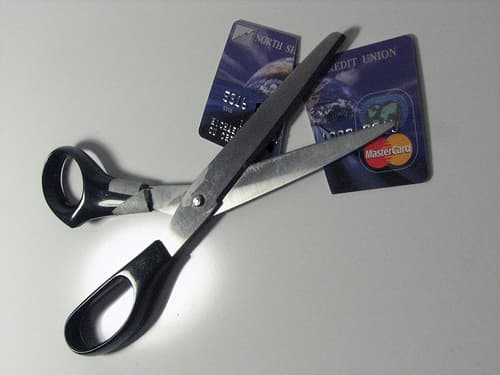Avoid the Trap of College Credit Card Debt
- Understand that if you don't pay your bill in full each month, your purchases cost more than the sticker price.
- Pay your bills on time to avoid late fees and huge interest rate hikes.
- Beware of credit card offers with a low 'teaser rate' that adjust to a much higher interest rate.
How to be a Below Average (in Debt) College Graduate.
If you are the average college student, you will graduate with a $2,000 credit card balance. If you only pay the minimum each month, that $2,000 could take 7 years to pay off and cost you $1,000 in interest.
Save yourself money by avoiding credit card debt, or by paying it off now, if you’ve already built up a balance.
Avoid College Student Credit Card Debt
Having a credit card is not a bad thing. It helps you build a positive credit history — if you use it wisely.
Don’t accept credit cards with interest rates above 16%. If the offer is 3% now, but 18% in six months, say no.
You should also look for a card with no annual fee. There are so many free cards out there, there’s no reason to pay for one. Also make sure you’re not required to carry a balance in order to get a free reward, like a computer or iPod. In that case, the computer isn’t free; you’re paying for it with interest on your other purchases.
If you already accepted a card with high interest or fees, pay it off or transfer the money to a low-interest, no-fee card and close the expensive account.
Use Credit Wisely
Use your credit card carefully. Before you buy something, ask yourself if you can afford to pay for it in full at the end of the month. If you can’t then wait to buy it.
Remember, even though it seems easy to charge things now, you will eventually have to pay for that purchase. At minimum wage, or a low starting wage after college, you have to work more than 23 hours to pay for a $200 cell phone plus interest.
It’s a good idea to have a credit card on hand for emergencies and necessities. Car repairs and groceries are necessities.
Pizza, movies, and concert tickets are not. If you earn enough to pay the bill for those fun things at the end of the month, then it’s okay to charge them (though it is never too early to start building an emergency fund).
Do Not Carry a Balance
According to a credit card myth, carrying a balance improves your credit score. This is not true. Carrying a balance attracts more credit card offers, and it costs you more money. Try to pay off your credit card every month.
Pay Off Student Credit Card Debt
If you already accumulated debt, do not wait until you graduate to start paying it off. The sooner you start, the less money it will cost you in the end. Follow these tips to get out of debt faster:
- Live within your means. The freedom to use a credit card is not a license to spend money. Don’t spend more than you can afford to spend, treating your credit card like free money. Remember that if you don’t pay your bill in full each month, the interest you are charged inflates the cost of what you bought. Consider whether the $50 purchase you make would be worth paying the $70 it will cost you, if you pay it over time.
- Pay off the card with the highest interest rate first. If you have more than one card, the pay as much as you can on the card with the highest interest rate and only the required monthly minimum payment on the rest of your cards. When the first one is paid off, start paying more on the second one. If you don’t have a part-time job, get one so you can start paying your debts.
- Don’t charge new purchases. If you can’t avoid the temptation to charge more, ask your parents to hold onto your cards. If you want to fit in with friends who have cards, get a debit card. It’s convenient and it won’t collect interest because the money is removed from you bank account right away.
- Always pay on time. If you’re late, even by one day, your credit card company can increase your interest rate to 29% and charge you a hefty late fee. Your other credit card issuers can also boost your interest rate, even if you aren’t late paying them. Consider using an automatic bill paying system, paying your bills online through the creditor’s Web site or your bank’s Web site.
- Ask for a lower interest rate.. Your credit card company wants to keep you as a customer. If you ask for a rate reduction, they might do it. While you’re on the phone, ask them to reduce your credit limit so you can’t charge anything else on the card.
- Transfer your balances. If you have money to make payments and your card companies won’t reduce your rate, apply for a low-interest rate card and transfer your balances. Then pay off the card before the low-interest period runs out.
It is best to avoid student credit card debt, but if you already have it, do not wait to pay it off. The sooner you start working to get out from under your debts, the better your chances to leave college debt free, leaving you able to enjoy more of your money after college.
